Cut into medical institutions, Tencent, Ali did not try, but the past business is too shallow and too scattered. After Tencent announced that it had invested 1.266 billion yuan in Donghua Integrity and held a 5% stake in Donghua Software, Ali finally couldn’t help but rushed to another medical informatization giant Weining Health.
Weining Health Announced that the major issues involved in this plan involve the company's individual major shareholders are negotiating with Yunxin, Weining Health equity transfer ratio is expected to reach 5% or more (including 5%), but the equity transfer does not involve company control The right to change. According to the recent communication intention, the two sides intend to carry out in-depth and comprehensive cooperation in the field of Internet + medical health, and further promote the strategic cooperation upgrade between the two sides.
According to the data of the national enterprise information credit publicity system, Shanghai Yunxin is a wholly-owned subsidiary of Zhejiang Ant Micro Finance.
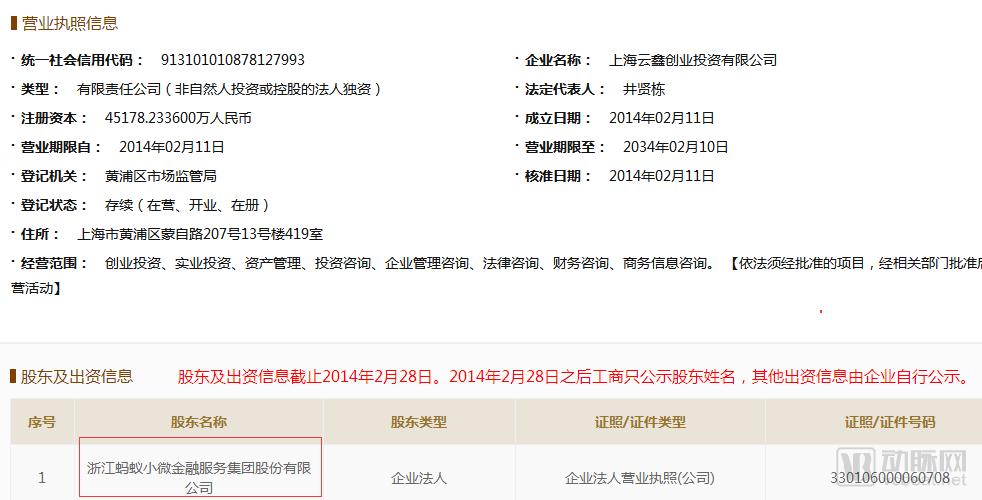
Holding 5% of the equity in this area, Tencent and Ali are obviously not in order to obtain the company's decision-making power. The meaning of the drunkard may be to truly penetrate the medical information market and build an ecosystem.
Why do these companies suddenly become popular? The arterial network judges that the threshold of medical institutions is too high. In addition to mobile payment, medical institutions have basically no hard demand for Internet companies, so they urgently need to enter the medical market through medical IT companies.
Not just the hospital’s need
The arterial network has been analyzed and summarized. The layout of Tencent and Ali in the medical industry is as follows:
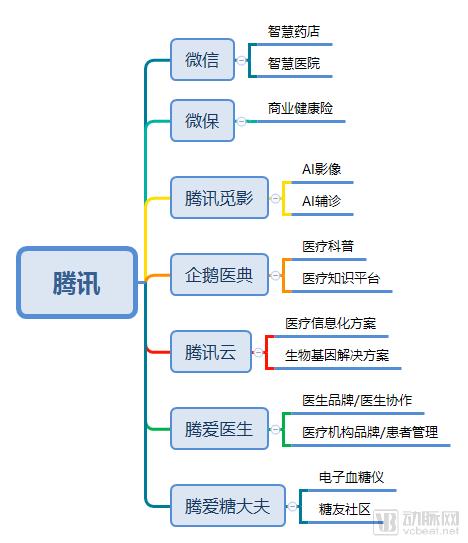
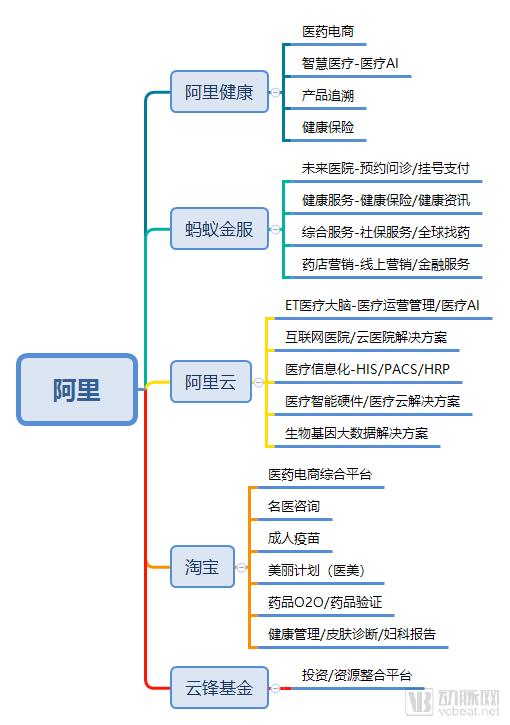
In this series of products, you can see Tencent's first insurance platform WeSure ("micro-protection"), medical version of the "encyclopedia" penguin medical code, doctor social platform and doctor tools Dr. Teng Ai, And smart portable blood glucose meter to love the sugar doctor.
However, it seems that only the medical institutions are closely connected, only through the consultation (online AI consultation, intelligent customer service consultation), registration (online registration), consultation (online consultation, offline AI auxiliary diagnosis), inspection (offline AI image) , AI pathology), payment (medical insurance / commercial insurance online payment, medical insurance offline scanning code payment), treatment (pharmaceutical online distribution, offline prescription circulation), post-diagnosis (AI follow-up, online renewal) and other links, open to medical treatment The WeChat Wisdom Hospital of the process.
Ali is also the same. Except for Ali's healthy medical e-commerce business, it only claims to connect more than 1,500 public hospitals, covering 30 provinces, autonomous regions and cities, and nearly 200 cities, providing real-name registration, mobile payment, report inquiry, etc. Alipay, which serves more than 300 million people, can truly be regarded as providing services to hospitals.
But even for mobile payments, both companies are expanding their markets in second-tier cities or prefecture-level cities.
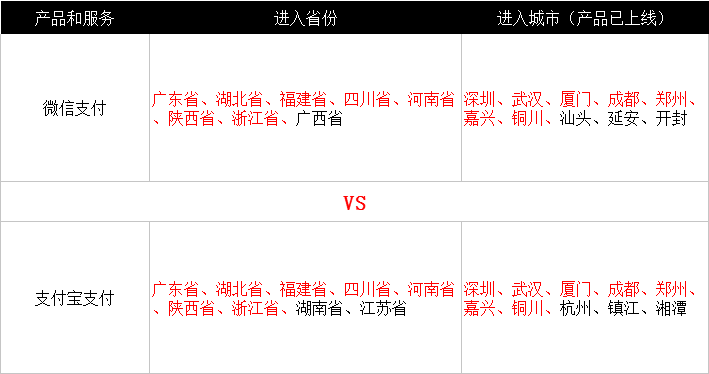
(Source: Tencent and Ant Financial Service Open Information Deadline: November 2017 Note: Red is the same province or region as WeChat and Alipay)
In addition to mobile payment products, it seems that Tencent and Ali's products have been broken in individual hospitals and it is difficult to get into the room. The most important reason is that medical informatization has been highly standardized, and products that do not enter the standardization system are difficult to enter the hospital, because for them, your service is not really just needed.
Holding the "thigh" of the head business
In any industry, head companies have the most say, and they even affect the standardization of the industry.
In 2016, the National Health and Family Planning Commission issued the "Notice on the Application Guidelines for Hospital Information Platforms". This document is the "Guidelines for the Application of Hospital Informationization Construction (2017 Edition, Trial)" and the National Hospital Informationization Construction Standards and Specifications ( Trial) The predecessor. It can be said that companies that are eligible to participate in the preparation of this document can basically represent domestic leading enterprises in medical information.
In the "Notice on the Application Guidelines for Hospital Information Platforms", the arterial network found this list, and Donghua Software and Weining Health ranked among them.
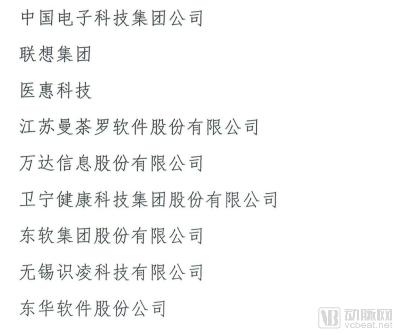
In addition, there are three industry-recognized standards for domestic hospital informationization. The National Health Statistics Information Center organized the national medical health information interconnection standardization maturity assessment, the National Health and Family Planning Commission Hospital Management Institute's "Electronic Medical Record System Application Level Evaluation Standard", and HIMSSEM RAM rating.
The assessment projects involved in these standards, the current domestic Internet companies are still unable to provide corresponding solutions. Therefore, in these three major informationization standards, you can't see Tencent and Ali, and basically some medical IT giants are participating.
For example, in 2014, the Information and Statistics Center of the National Health and Family Planning Commission announced that the first three regions and four hospitals had passed the regional (hospital) information interconnection standardization maturity level evaluation. The First Affiliated Hospital of Zhejiang University School of Medicine successfully passed the assessment, and the project was invested by Medical Technology.
At the beginning of May 2016, Donghua successfully won the bid for the Beijing Hospital Information Platform Construction Project. Immediately after the development and implementation team of the Ministry of Health, the hospital and the hospital set up a hospital information platform project team. After nearly a month of research and demonstration, the Donghua technical team and the hospital information department and related departments have established a hospital information platform construction plan with the goal of standardization and maturity measurement through the interconnection and standardization.
In May 2017, after being tested and evaluated by the expert group, Beijing Hospital successfully obtained the “Level 4 of Classroom Information Interconnection Standardization Maturity Assessmentâ€.
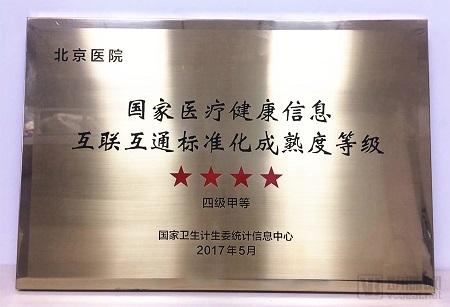
Image source: Donghua Software
In June 2017, Shanghai Sixth People's Hospital officially passed the six-level on-site review of HIMSS EMRAM. In the cooperation with Weining Health, Shanghai Sixth People's Hospital has comprehensively applied the latter's drug logistics, blood closure, clinical assistant decision-making and other information products, and its effectiveness has been evaluated by the review team. Highly praised.
In the Internet industry, Tencent and Ali are absolute standard participants.
On April 6, 2016, the full standard will be established in Hangzhou. Liu, the chairman of the China Brand Building Promotion Association, is the chairman of the committee, and Ma Yun, chairman of the board of directors of Alibaba Group, is the vice chairman. The main task of the full standard committee is to establish and improve relevant standards in the field of e-commerce.
Ali's e-commerce, Tencent's socialization, and even the logistics, network car, Internet finance, etc. covered in the two business maps, both have a great say in their respective fields. But in the medical industry, the energy of Tencent and Ali has always been difficult to reach the core. Therefore, you can only choose to cooperate with industry leaders.
Before Ali's series of capital injections, it was more like a preview before the battlefield. (On May 19, 2017, Alibaba Health's Hongyun Jiukang injected 291 million yuan into Jiahe Meikang, a domestic clinical information software provider. In October 2017, Ali Health took the full amount of Mancharo 6434 in cash subscription. 1.78 million yuan will increase.)
Cooperation is only the beginning. The most important thing is the clear direction of the business. How to find the combination point of the two parties.
Cloud era, officially opened
Internet companies' products basically adopt cloud architecture. In the past, due to security issues and few policy boosts, Tencent’s and Ali’s initiatives have followed suit, and more attempts have been made to sign strategic cooperation agreements for exploratory cooperation. E.g:
In July 2017, Tencent and CLP Data launched a strategic partnership to establish a medical big data security cloud platform.
In July 2017, Yilianzhong teamed up with Tencent to promote WeChat's mobile online payment service in nearly 100 hospitals.
In September 2017, Tencent Cloud signed a strategic cooperation agreement with Wanda Information to carry out in-depth cooperation in smart city construction and smart retail.
......
Even Aliyun, the boss of the domestic public cloud market, can only go around the periphery of the medical circle.
For example, the Tianchi Medical Competition (Artificial Intelligence Lung Nodule Algorithm Competition) provides the infrastructure layer, the flying distributed cloud operating system layer, the cloud and big data layer three-tier architecture, and the cloud and big data layer independently developed by Alibaba Cloud. Computational products (ECS, NAS, SLB, VPC) and big data products (ODPS, PAI).
In the competition, 90% or 95% of the teams use 3D solutions. Alibaba Cloud's PAI is based on a powerful linear expansion capability that provides a solution for 3D. The participating teams can process more than 32 128x128x128 or even larger 3D images at high speed in each iteration to improve the accuracy and effect of nodule detection.
In cooperation with Genes, we provide storage and data analysis services for gene sequencing companies in a variety of modes, including computational fees and monthly subscriptions.
Alibaba Cloud Object Storage oss provides three types of standard, low frequency and archive. The real-time access speed of standard storage is fast, and the access speed of archive storage will have a thawing time of less than 1 minute. If you don't need frequently accessed data, it's better to put it in low frequency or archive storage, and the price will be cheaper.
For example, when some gene companies need to conduct research and analysis on genetic data, data is frequently used, and standard storage is required. For some past data, such as user sequencing data many years ago, low frequency or archive storage is generally used.
Internet companies such as Tencent and Ali certainly hope to get through the data of the hospital's various information systems and store the data on the cloud platform, but this is not easy to push. The industry's general perception is that hospital data is sensitive and confidential, especially patient information privacy. The hospital has high requirements on the real-time and stability of the system and the safety of medical data.
Article 5 of the "Network Security Law of the People's Republic of China" clearly stipulates that the State shall take measures to monitor, defend and dispose of cybersecurity risks and threats originating inside and outside the People's Republic of China, and protect key information infrastructure from attacks, intrusions, interference and Destroy, punish cybercrime and criminal activities in accordance with the law, and maintain cyberspace security and order.
It is precisely because of the protection of national medical data that the hospital information management department is very concerned about the background of cloud computing companies, and it is more conservative for cloud products like AWS, Microsoft and other foreign companies. Therefore, from the perspective of the choice of cloud computing products, there are relatively few opportunities for a few companies such as Alibaba Cloud and Tencent Cloud.
In addition, doctors value medical data very much, especially in scientific research, doctors are not willing to store information on the cloud platform. At present, the contents of the cloud on the hospital mainly include non-medical core contents such as office systems and medical examination systems. But Shangyun, such as EMR, HIS, LIS and other systems, still hesitates and is conservative.
Until the introduction of a standard document. In April 2018, the National Health and Health Commission formulated and developed the "National Hospital Informationization Construction Standards and Regulations (Trial)" for the purpose of promoting and standardizing the hospital's informatization construction. The document consists of 5 chapters and 22 categories, with a total of 262 specific contents, which clarifies the construction content and construction requirements of the next stage hospital informationization.
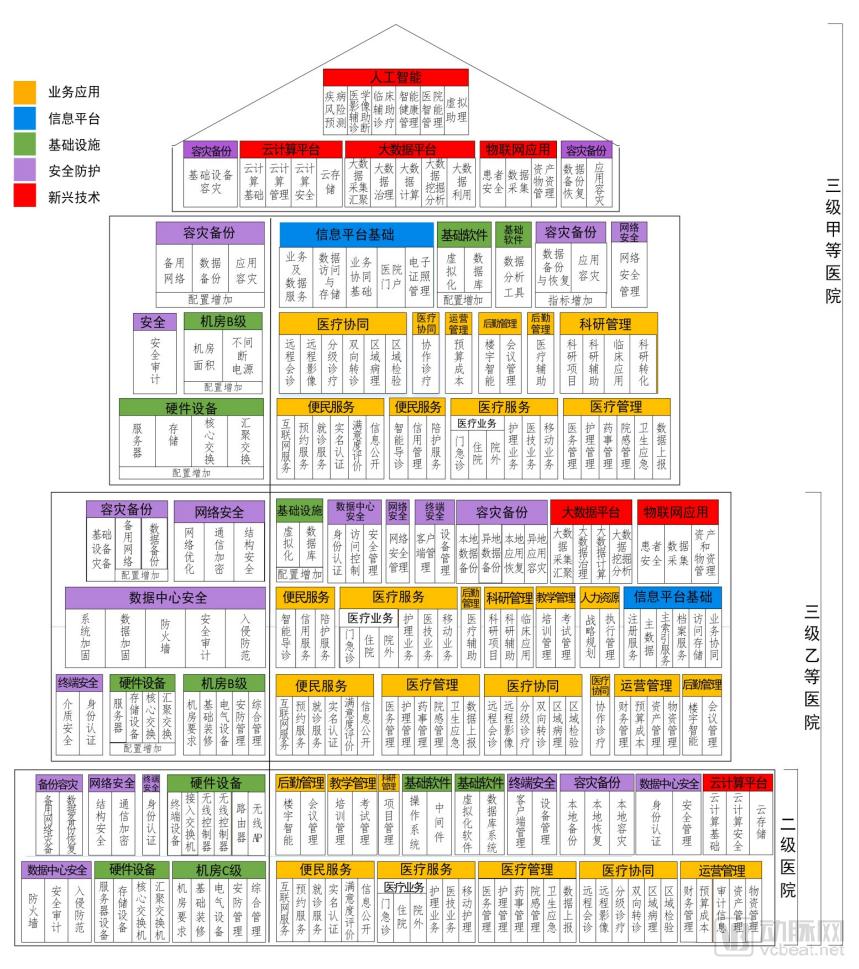
In this document, cloud computing, big data, artificial intelligence and the Internet of Things and emerging technologies have emerged at the top of the top three hospitals' informatization construction. For Ali and Tencent, which are the top two in the domestic public cloud market, the opportunity has finally arrived.
In the future, the new market structure?
"Cloud, big, object, shift, wisdom", the following picture, can basically describe the relationship between these technologies:
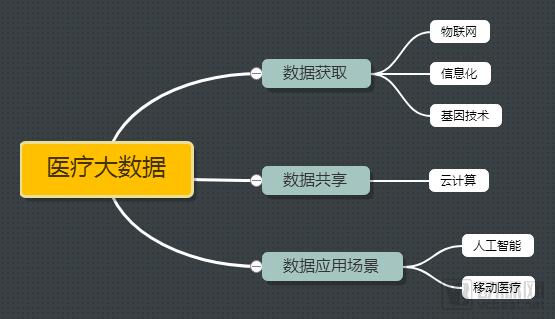
According to Sun Yifeng, industry director of the Mobile Information Research Center, teaming with industry system integrators is the main strategy for deploying medical clouds. Interfacing with the hospital's underlying system is the core link in the entire hospital cloud industry chain, and it is also a difficult link. Both Internet companies and traditional IT providers use the cooperation with system integrators in the medical industry as an entry point to penetrate into the underlying systems of the medical industry.
In this case, the competition of the medical cloud will eventually evolve into a power struggle and resource dispute between these partners. The way in which the medical cloud competes will no longer be a single fight, but a group battle in an alliance.
The point is that the word "alliance".
On May 16, Inspur initiated the establishment of China's first health care big data industry ecological strategic alliance. The first group of members include Xiamen Zhiye, Miaojiajia, Huajian Lanhai, Kangfuzi, Renhe Future, Shandong University, Jinan Production and Investment Group and other more than 30 member units.
Similar to the wave, in 2018, the CLP Health Fund participated in the investment of the real-name doctor platform medical association, the Internet of Things artificial intelligence service provider Yun Zhisheng, the medical natural language processing company Senyi Intelligent, and the pharmaceutical industry supply chain technology enterprise. The four investments involve a total investment of nearly 700 million yuan.
Although the two health care big data companies frequently interact with medical companies, the methods are fundamentally different. One party uses industry alliance cooperation, and one party is capital stock. However, judging from the recent moves of the two, the health care big data industry has officially entered the integration phase of the enclosure.
Alliance and alliance, which can not help but reminiscent, Tencent and Ali's series of actions seem to be closely related to health care big data.
After Tencent invested, Han Shibin, vice president of Donghua Software, said: "The core value of Donghua Software is not net profit, but medical big data. 30% of the top 100 hospitals in China use Donghua's HIS system. The accumulated big data value is very high."
It can be seen that health care big data is one of the important factors that have contributed to the cooperation between Internet giants and medical IT giants.
Especially on April 28th, the "Opinions on Promoting the Development of Internet + Medical Health" issued by the General Office of the State Council highlighted the Internet hospitals, telemedicine , information sharing and family doctors signing, etc. The new market opportunities of information technology companies have pointed out the direction.
With the emergence of bottlenecks in traditional hospital information systems, the penetration of Internet companies has intensified, and a new generation of cloud products with integrated, integrated, intelligent and interconnected systems is expected to become the focus of hospital informationization upgrades. Therefore, we saw that Ali, who rarely participated in the medical informatization conference, made a high-profile appearance at the 2018 China Hospital Information Network Conference with the nailed future hospital. The core of the future hospital is the ecology and the cloud.
According to the arterial network, the partners of the future hospitals will be strictly screened, and the medical ecological partners who are qualified by each region will be responsible for the attribution of the future hospital. In other words, any medical IT company, as long as it can be screened, can enter the information service system built by the nail.
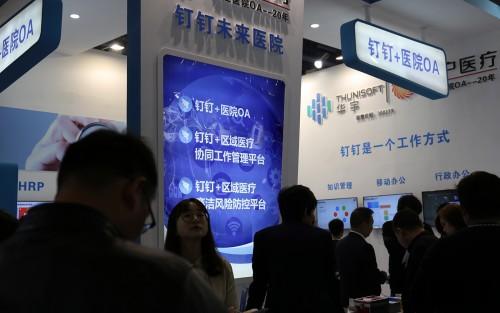
Image source: Sohu Health
The implementation of the traditional medical information industry is based on hospitals. It is relatively fragmented. Every hospital needs to invest considerable manpower, material resources and financial resources, so the scale effect is not obvious. The domestic traditional medical information company is led by more than ten listed companies such as Donghua Software, Weining Health, Neusoft Group and Wanda Information. After nearly two decades of development, the market structure has long been settled, and the Matthew effect in the true sense has not been formed, and the industry concentration is low.
The industrial alliance formed by medical IT companies and Internet companies such as Tencent and Ali, driven by health care big data, will lead the new pattern of medical information market in the future.
The Greenhouse Exhaust fan is popular in recent years.The Greenhouse Exhaust fan is a new environmentally friendly and energy-saving plant ventilation cooling equipment, because of the exhaust fan's large amount of ventilation, ventilation and cooling effect is good, low noise, the installation of the use of the site of the smallest destructive, cheap to buy, wide range of applications, Long life and other significant features, more and more users are loved.
Under the action of gravity, water flows from top to bottom, forming a water film on the surface of the corrugated fiber of the wet curtain. It and the fan form the Air Circulation System .When the fast flowing air passes through the wet curtain, the water in the water film absorbs the heat in the air and evaporates and takes away a lot of latent heat, so that the temperate of the air passing the wet curtain is lowered, so as to achieve the aim of cooling.Widely used in Tomato And Cucumber Greenhouse and Glass Greenhouse
Working principle: "water evaporation absorbs heat"
Wet Pad And Fan Cooling,Greenhouse Exhaust Fan,Cooling System Exhaust Fan,Exhaust Fan With Shutter
Qingzhou JuLong Agriculture Equipment Co.,Ltd , https://www.julonggrowtech.com